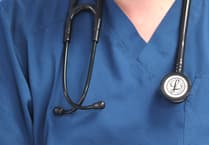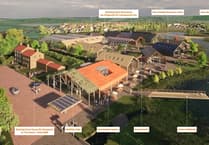IT may be hard to believe but behind that £1.50 bottle of famous name soft drinks such as Lucozade and Ribena are investments of millions of pounds and some mind-boggling processes.
Last week the first bottles came off a new, £13 million, energy efficient production line at the Lucozade Ribena Suntory plant in Coleford.
The new line – which fills 55,000 bottles an hour – was officially commissioned when the plant’s chief operating officer Carol Robert and Forest of Dean MP Mark Harper pushed the button last Friday.
The new German-made production line cost £10 million with the other £3 million going to local contractors who installed supporting infrastructure.
Carol Robert said: “The launch of this production line is significant for us and forms part of our ‘Growing for Good’ vision.
“It’s fantastic to have been able to invest £13 million in this line and to deliver a 40 per cent reduction in the energy and water required to make each bottle.
“In doing so, we are making an important commitment to both the environment and our consumers.”
Mr Harper said: “It’s a real vote of confidence in the site and the people who work here.
“The decision was made at a time when there was a lot of uncertainty – the company was saying this is a great site with great people.”
Work on the project started in 2017 in the light of increased sales and the realisation that manufacturing processes had to be improved.
The new line uses the latest in dry aspetic technology which uses heat and pressurised air instead of water to sterilise the bottles before they are filled.
Plastic ‘preforms’ are heated to 140 degrees centigrade and hydrogen peroxide is added as they pass through a chamber.
The air pressure inside is 37 times greater than that outside and it is this force which creates the bottle’s shape – which is completely sterile inside and out.
Head of engineering Tom Crawford said: “The new machine will run at 55,000 bottles an hour, the old one ran at 36,000 but the efficiencies and reliability on this one are significantly greater.
“We’ve made about 1.4 billion bottles on the old machine over its life (of 17 years).
“If we ran the new machine at the same levels as the old one, we’d have made 2.14 billion bottles, an extra 700 million bottles of Lucozade Sport would have been in the market place.
“I started working on the project in August 2017.
“We knew we had increased sales and we knew we had to improve our manufacturing facilities.
“We went and looked at best in class in Britain and Europe and spoke to colleagues in Japan
“The support from Suntory was instant.
“For two years on the trot we’d shown success in every investment, and we’d shown success in our performance as a site, so the support was there.”
Three companies were initially in the running to supply the new production line but the environmental performance was the deciding factor in a close race.
It was 12 months between the order being placed and the first bottles coming off the line.
Most soft drinks are quite acidic which helps to extend shelf life but the aim with the new line was to produce drinks which are more ‘neutral’ in pH chemical terms.
Supply chain director Chris Kane said: “They have been difficult to make because they are not shelf stable but they are better health wise. They are better for teeth.’’
Tests were carried out on 30,000 bottles to establish that the required levels of sterility could be achieved.
Mr Crawford said: “Most places test 10,000 bottles and allow three failures, do three runs and leave the samples in a warm area at about 27 degrees for two weeks.
“We left it for three weeks at zero tolerance – if we had one failure we could do another run of 10,000. If that didn’t pass we’d have to start again from scratch.’’
The plant employs around 350 people, 90 per cent of whom live locally.
The type of work at the factory is also changing with more high skilled jobs.
Mr Crawford said: “For example, we’ve got four guys who started here shifting pallets around and are now on an intensive course at college to enable them to control laser-guided equipment.’’
The investment at Coleford – which began producing Ribena in 1947 – is part of the Japanese drinks giant’s philosophy of ‘mizu to ikiru’ which translates as ‘living with water’.
The company also plans to produce 100 per cent sustainable plastic bottles by 2030.
Mr Crawford said the £13 million investment in the new filler was part of wider improvements to the Coleford factory.
He said: “I’ve been here five years this year and we’ve spent anywhere between £12.5m and £14m every year.
“In the same time we’ve been doing the filler, we’ve put new process equipment in for two lines, we’ve put in completely new packaging lines,demolished and rebuilt the warehouse and automated a lot of the pallet movements around the site.
‘‘We also have new systems that monitor all our data and new computers in the blends department.
‘‘Everything that comes to site goes through blends.”




